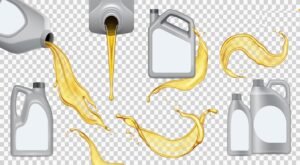Oil Leakages in Cars | Top causes.
Here are the main reasons for Oil leakages in cars.
- Leakage from oil drain plug.
The device for draining oil from the engine is the Oil Drain Plug.
If the drain plug is damaged or worn, it can lead to an oil leak. When the oil drain plug or the oil plug sealing is not replaced after each oil change, it often results in oil leakages in autos. Ensure the oil plug is firmly secured to prevent any potential leaks. The oil drain plug can be found on the bottom of the oil sump and is easily accessible from underneath the vehicle. These leaks are known as oil sump leaks.
- Cap for filling the oil reservoir:
This oil leak is likely one of the least concerning, as it occurs when the oil filler cap becomes loose. You may notice oil puddles under your car, and you can resolve the leak by either tightening the cap or replacing it if it’s damaged.
- Gasket for a valve:
The valve cover shields the components within the cylinder head, while the gasket creates a seal between the cylinder head and the valve cover. If you notice oil coming from the top of the engine, it may indicate a leak. If you notice a leak coming from the valve cover gasket, it’s a sign that it needs to be replaced. Valve cover gaskets can deteriorate over time and require maintenance.
- Overfilling of Engine oil:
On occasion, an oil leak, including a turbo oil leak, may result from overfilling the oil. If you see an oil puddle under your car, but the engine oil light on the dashboard is not blinking, that’s a clear sign that something is wrong. Crankcase ventilation is an important process in maintaining the health of an engine.
The crankcase is commonly ventilated through a valve and a hose that leads to the intake. The ventilation system ensures that the car’s compression does not result in an overpressure within the crankcase. Should the ventilation become blocked, it could cause the engine to become over-pressurized, resulting in potential oil leaks as the oil seeks to escape from the engine.
- The Head Gasket has been damaged:
If the head gasket is damaged, the oil can seep into the coolant system’s combustion chamber. A leak in the oil pressure channels near the head gasket edge can cause oil to escape from the engine externally. If oil is leaking from the right side of the engine, it may also indicate that the gasket is damaged.
- Seals for Crankshafts or Camshafts:
The constant spinning of the crankshaft and camshaft seals can lead to wear and tear on the sealing. There is an oil leak coming from the gearbox housing. It appears to be a crankshaft engine oil seal leak, also known as a gear oil leakage.
- Oil Cooler Leaks:-
Chances are, if there are any leaks coming from the front of the engine, they are likely originating from the engine oil cooler. Oil leakages in cars are a common issue because the seals are made of plastic, and they can crack, causing leaks. Replacing the plastic sealer should fix the engine oil leak. An oil pressure sensor is a device used to monitor the pressure of the oil in a vehicle’s engine.
It is an important component in ensuring the proper functioning of the engine and helps to prevent damage caused by low oil pressure.
The oil pressure sensor can be found either in the cylinder head or on the engine block, typically made of plastic. Over time, it may develop cracks and result in a leak. This can be easily replaced and is also very cost-effective.
The engine part known as the cylinder head or engine block is crucial for proper function.
Insufficient coolant in the cooling system can lead to the coolant freezing. If the engine block is cracked or has rust holes, it’s recommended to replace the entire engine.
In addition to these potential leaks, oil can escape from your exhaust, a condition known as exhaust oil leakage, or from your shock absorber. Any of the mentioned causes could lead to these issues, so a visit to the mechanic could be beneficial.
Motor leaking oil |Ways to Prevent oil Leakages in cars.
If your car is leaking oil, here are a couple of methods to fix the issue:
- Make it a habit to change the oil and filter as per the recommendation of the engine manufacturer. This helps avoid using low-quality oil and keeps the engine running smoothly. Plus, fresh oil improves the engine’s health and performance.
- It is important to always use the correct type of oil based on the information provided in the owner’s manual.
- It’s crucial to ensure that the oil is filled to the correct level to avoid overfilling and potential oil leaks.
- Additives are used to enhance the properties of a substance.
Additives such as No Leak or Stop Leak offer quick solutions to your leakage issues. Most leaks can be fixed with these additives; however, severe leaks may require a different solution. These additives work to soften and condition the old gaskets, which helps them to expand and stop additional leaks from occurring. - When in need of expert advice about your car, it’s best to consult with a certified mechanic. If you’re not great at spotting issues with your car, it’s a good idea to seek advice from a mechanic. They can pinpoint any problems or leaks that you might not have noticed.



